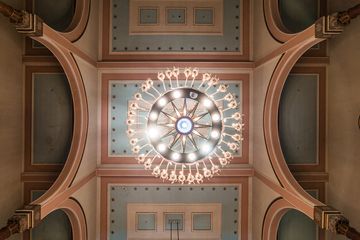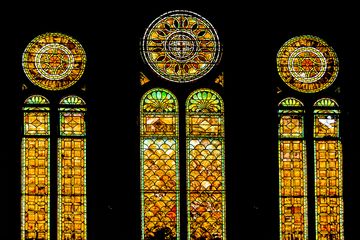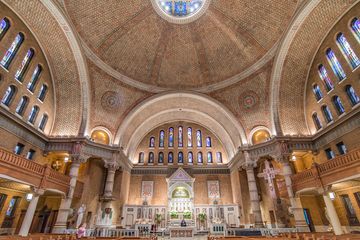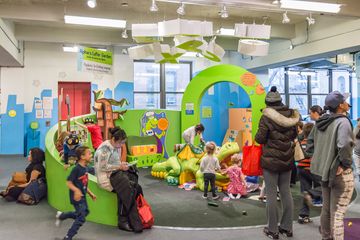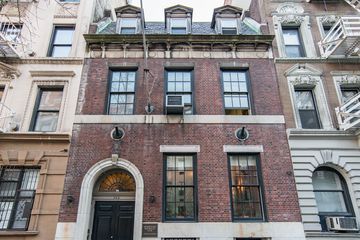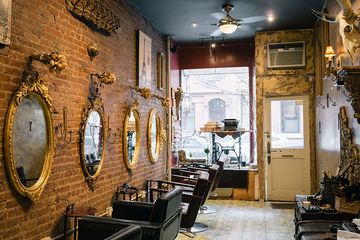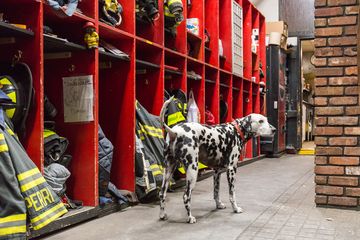All parents throughout New York, locals and tourists alike, should know about the educational and transformative experience of the Children's Museum of Manhattan. The 83rd Street institution, although it opened in 1973, has been at its current location since 1989. It is an extraordinary (not to mention really fun! ) resource for both kids and adults. I happened to visit during the week that constitutes winter break for New York schools, and so I witnessed an incredible amount of excitement and enthusiasm on each of the floors. Children as young as a few weeks old were in their mother's arms or being pushed in a stroller while their siblings were running around, checking out the interactive exhibits. Almost every aspect of the museum had something to push, touch, or listen to, giving children a tactile way of learning and remembering. I received an eye-opening tour from David Rios, the Director of Public Programs, who guided me from the fifth floor back to ground level. An exhibit called Playworks, designed for early learning, is located upstairs. For more than ten years, the museum's team worked side by side with child development experts to create a space where little ones can enhance their motor skills and problem-solving abilities. I enjoyed standing on the sidelines and observing children climbing in and out of a large wooden FDNY truck, a NYC bus, and a deli with plastic foods. As David explained, "Some museums have a supermarket, but we're in New York, so we have a deli. "I was amazed by how often the museum catered to varying age levels within the same space. For example, in the Movers and Shakers section, older children could learn math and physics by building mini roller coasters while younger siblings could crawl through tunnels and slide down slides. I was delighted to see parents participating with their children: this is definitely a museum where entire families can enjoy themselves, and children's learning is enhanced by parental guidance. Though there are plenty of buttons that encourage children to learn on their own, there is also signage so that parents can provide a further explanation to their kids. The museum is designed so that parents and older children do not feel intimidated or shy about trying out the different exhibits. As David stated so nicely, "This is a fun, non-judgmental environment for all ages to learn. "Continuing on, I entered The Lab, where children can read stories, sing songs, and learn more about art and science. All of the writing and sound bites are bilingual, since Spanish-speaking families make up such a significant portion of New York City's population. David told me that The Lab sometimes holds special events, such as a visit from members of Alvin Ailey, who danced with the children in an effort to teach them about movement. The next room took Peek-a-Boo to a whole new level with a digital version of the game and in the following room, I had to laugh out loud as I explored the digestive system, complete with a talking toilet. The grand finale of the tour was the America to Zanzibar: Muslim Cultures Near and Far special exhibit that is running from February 2016 - February 2017. The visually compelling exhibit is a multimedia exploration of the diversity of Muslim cultures within the United States and abroad. It is a collaboration between the museum's staff and members of the Muslim community and is an ingenious way of introducing children to topical cultural differences in an age-appropriate way. For example, there is a section where kids can press buttons to smell a variety of fruits and spices, as well as a collection of "Objects and Stories from American Muslim Homes. " Some other highlights included a life-size camel, musical instruments, and a virtual reality room that allows visitors to explore the architectural styles of different mosques. I was pleased to find out Mayor Bill de Blasio supports the exhibit. He has stated, "With America to Zanzibar, children will have the chance to learn about Muslim cultures in an engaging and thoughtful way. We only grow stronger when we embrace and celebrate the multitude of cultural backgrounds that make up New York. "
